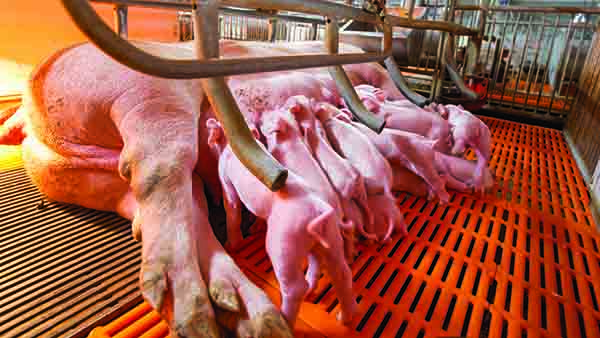MPs on the Agriculture Bill Committee have rejected an attempt by a Labour MP to insert an amendment into the Bill banning farrowing crates.
Former Defra Secretary Theresa Villiers recently confirmed the Government’s intention to phase out farrowing crates.
But as the Bill’s finer details were debated during the Committee Stage in the Commons, Cambridge Labour MP Daniel Zeichner tabled a ‘probing amendment’ that would ‘end the use of sow farrowing crates, subject to delayed commencement at the discretion of the Secretary of State’.
The new clause would allow for a phasing out of farrowing stalls, while making resources and finance available ‘to support farmers with the capital costs of that process, as well as those who take interim measures to improve the conditions of farrowing sows’.
Acknowledging that this is a ‘contentious subject’, he added: “The public take the issue seriously and we would all like it to be achieved over time.”
The amendment was comfortably rejected by other MPs on the committee, with support for the industry position receiving strong opposition from former Defra Minister Robert Goodwill and new Defra Minister Victoria Prentis, who had both been briefed by the NPA on the subject.
 Mr Goodwill (left) warned of the danger that ‘history might repeat itself, and the law of unintended consequences may come into play’ if the UK unilaterally banned farrowing crates, a reference to the ill-fated 1999 sow stall ban.
Mr Goodwill (left) warned of the danger that ‘history might repeat itself, and the law of unintended consequences may come into play’ if the UK unilaterally banned farrowing crates, a reference to the ill-fated 1999 sow stall ban.
“When dry sow stalls were banned in 1999, there was an erosion of the British pig market, particularly by such countries as Denmark and Holland where dry sow stalls were still being used. Indeed, most of the EU still allows dry sow stalls from up to four weeks after service to birth, when in some cases they may be put into farrowing crates as well,” he said.
“My concern is that, were we to act unilaterally through legislation, we could end up having more pigs coming into the country as imports.”
 Ms Prentis (right) confirmed that it was the Government’s aim ‘for farrowing crates no longer to be necessary’. But she stressed: “It would not be right to end the use of such crates without examining all the evidence around their use and considering all the options. It is important to recognise how they protect piglets, for example.”
Ms Prentis (right) confirmed that it was the Government’s aim ‘for farrowing crates no longer to be necessary’. But she stressed: “It would not be right to end the use of such crates without examining all the evidence around their use and considering all the options. It is important to recognise how they protect piglets, for example.”
The new Defra Minister highlighted the fact that alternative farrowing systems are being developed ‘all the time’, but said they need to be ‘investigated fully’.
She also suggested that funding under the new domestic agriculture policy could be used to help producers switch to alternative farrowing systems.
“It may well be the sort of public good for which the public is keen to pay, assuming we have sufficient transparency in our systems to ensure that they understand that that is what is happening,” she said.
NPA reaction
NPA senior policy adviser Ed Barker said: “We are firmly opposed to any moves to unilaterally ban farrowing crates and so we welcome the stance taken by the MPs in response to the tabled amendment.”
NPA chief executive Zoe Davies added: “This Government’s long-term objective to phase out farrowing crates has not gone away, but the brief debate demonstrated that our key messages are hitting home.
“We are pleased that the disastrous precedent of the 1999 sow stall ban is recognised within Government. There also appears to be a clear understanding that more work is needed on alternative systems, and that there are significant costs involved in moving to alternatives, not to mention the risks involved, in terms of piglet welfare and worker safety.
“Rather than banning farrowing crates, we want to see support provided for those choosing to switch voluntarily to alternative systems.”
The NPA has been proactive in briefing MPs on farrowing crates. All members of the committee debating the Agriculture Bill have been briefed in the NPA’s response to the Bill, put together by Mr Ed Barker.
The NPA has also been encouraging members to write to their MPs about why farrowing crates are used and why a ban is not the right approach. The association recently conducted a survey among members to establish views on farrowing crates and the barriers of moving to alternative systems.




